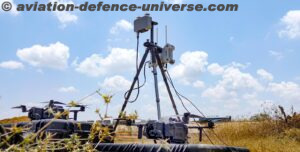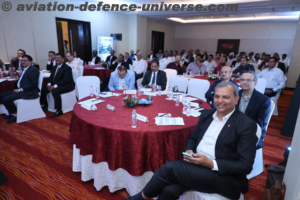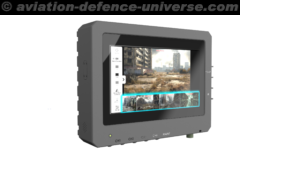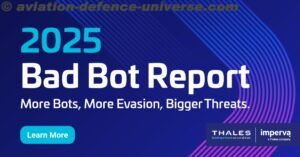 The air cargo industry is still taxiing onto the runway of AI opportunities. Leading technology group, CargoTech already offers products to ensure the smoothest of technology take-offs, with AI serving as the fuel for sound business decisions. Cédric Millet, CargoTech’s President, and its members illustrate ways in which the group leverages AI to support decision-making and clear up some of the myths surrounding the technology.
The air cargo industry is still taxiing onto the runway of AI opportunities. Leading technology group, CargoTech already offers products to ensure the smoothest of technology take-offs, with AI serving as the fuel for sound business decisions. Cédric Millet, CargoTech’s President, and its members illustrate ways in which the group leverages AI to support decision-making and clear up some of the myths surrounding the technology.
“On a scale of 1-10, I’d say the air cargo industry is currently at 3 when it comes to adopting AI-assisted decision-making,” says Cédric Millet, President of CargoTech. AI is sporadically used in different segments of the air cargo industry – mostly in customer service and engagement functions, because these have the greatest similarity to processes in other, more digitally-developed industries. Much of the air cargo industry is still in the phase of digitizing its operations and starting to accumulate data volumes. “To embark on the journey of AI-assisted decision-making, it is crucial to extract a large volume of data to train the models and to identify anomalies for better decision-making, going forward,” Millet explains.
Enhanced data integration
Data is currently heavily fragmented across stakeholders, leading to huge inefficiencies. AI models have the potential to be capable of synthesizing data across the supply chain, thus promoting better end-to-end visibility and decision-making. CargoAi already offers advanced AI-driven tools that assist in streamlining decision-making for logistics professionals, such as its CargoCOPILOT product: CargoAi’s AI email plugin enables the frontline workforce to retrieve dynamic rates directly via their inbox, without having to search across platforms.
Another practical application of AI aimed at enhancing commercial decision-making processes and born of collaboration with a number of airlines, is Rotate’s ‘Fair Share Analysis’ which not only informs airlines about their market position regarding market share and yield level, but is also a critical component when it comes to optimizing an airline’s network and Origin-Destination (OD) sales mix. Here, AI leverages proprietary capacity data and machine learning algorithms, incorporating market data to generate fair share estimations.
AI is an enabler, not a solver
Unlike the charter niche, the general air cargo industry faces the challenge of an abundance of data. “For a long period, the air cargo industry suffered from data scarcity, when it came to advanced data analysis. As data availability increased, Business Intelligence (BI) dashboards proliferated, sparking enthusiasm about the possibilities of applying Artificial Intelligence (AI) to revolutionize air cargo operations. However, there’s often a misconception that AI, in itself, will be able to solve some of the industry’s biggest challenges,” says Michael Teoh Head of Strategy at CargoTech. Experience has shown that AI does not replace the need for commercial teams to devise innovative use cases that drive value through better decision-making. AI should be viewed as an enabler rather than an end goal.
NO, the computer is not always right?
Wiremind Cargo’s CargoStack suite of Digital Solutions is designed with precisely this in mind: Wiremind Cargo’s models are developed to be as accurate and give the best recommendations possible, but there will always be scenarios where the model may not have seen something before, or users need to intervene. One complaint regarding AI is that it often acts as a ‘black box’, giving a recommended output but without showing how it came to its result. Wiremind Cargo proactively seeks to improve on this: Alongside its model recommendations, CargoStack Optimizer modules aim to transparently share relevant insights to users that show how the result was generated and allow them to make an informed decision as to whether they want to keep the value or override it (which they are always empowered to do). This is a very intentional product design approach to avoid the black box issue.
There is more to AI than ChatGPT
Wiremind Cargo has been implementing and delivering the benefits of AI to the air cargo industry since the company began. “it is important to remember that AI is quite a broad umbrella, not just ChatGPT/generative AI. Wiremind Cargo successfully deploys machine learning models that assist customers with commercial decisions regarding capacity and revenue management. Each of CargoStack Optimiser’s modules is powered by different AI models trained on the customer’s own data and tasked with trying to make specific predictions such as the amount of baggage expected on a flight, the show-up rate of bookings, or the optimal entry condition on a flight. By using Machine Learning models, CargoTech’s solutions are able to process vast data sets to spot trends and patterns, allowing the models to replicate what analysts would be doing at scale”.
Analog to digital is the first step
The cargo charter niche faces the greatest challenge when it comes to data availability and quality: Currently, crucial data is held within emails, messages, and analog channels. These analog formats first have to be digitized before we can begin to introduce AI-enabled tools. Aerios’ pioneering Carrier App is an important foundation as it facilitates this data gathering and is the gateway to implementing further value-adding AI and ML models in the Aerios product suite.
Long and short-term planning
AI will benefit carriers operating cargo charters in two key decision-making processes. Long-term planning is one area: Airlines operating both scheduled flights and charters want to know how much of their fleet they should make available for charter, what the peak charter lanes could be, and the weigh up of selling charter capacity compared to keeping the aircraft on a scheduled program. With the right amount of market data including common routings, commodity types and market verticals, AI can help find the optimum balance, offering aggregated market intelligence that supports longer term planning.
A second area is the charter operation quotation process: Carriers want to make informed decisions on which aircraft and routing within their network would be the best fit to maximize on available capacity. By combining historical internal data and request data within a machine learning model that learns past behaviors and patterns, AI could provide relevant information for charter salespeople on which to base their quotation decision.
Empowering and attracting employees
AI not only offers commercial decision-making benefits, but also opens up development opportunities. “There is often the misconception that AI leads to a reduction in employees,” states Cédric Millet. “At CargoTech, we believe that roles will not be replaced, but specific tasks within them may change.” For example, sales staff will be relieved from having to spend time analyzing data and trends to uncover target customers, as AI can identify sales leads and therefore enable the salesperson to spend more time with each customer. “AI will reshape roles to meet evolving needs, thus ensuring sustainability and empowering employees as they focus on strategic work and are encouraged to upskill with new tools,” he predicts. Through the automation of repetitive tasks, AI helps streamline processes, reduce errors, and enhance efficiency. And another bonus: “Cutting-edge technology attracts younger generations to the industry,” he summarizes – an important point in an industry that has long struggled to fill open positions.


































































































































